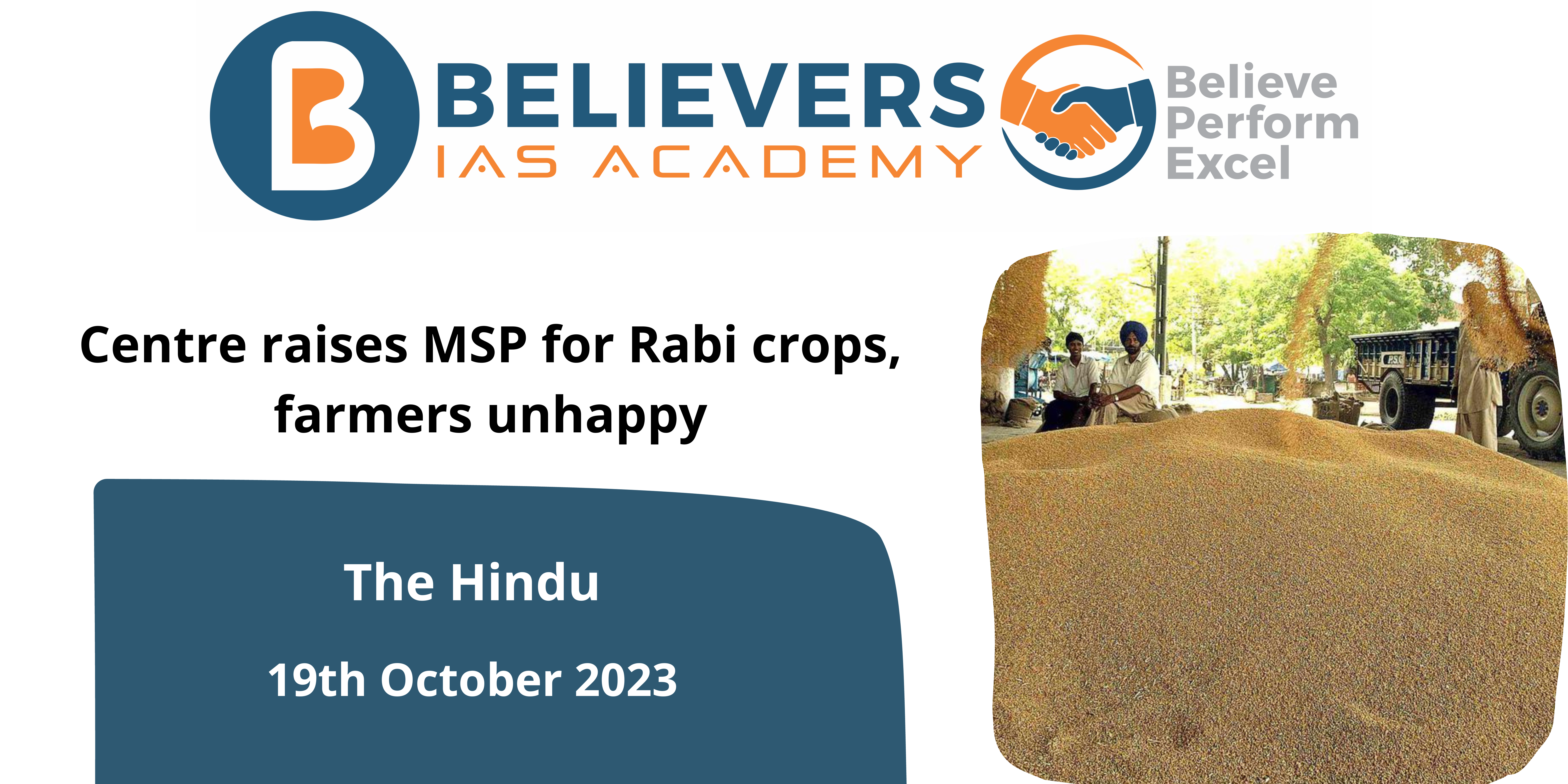Centre raises MSP for Rabi crops, farmers unhappy
Context
For the financial year 2024–2025, the Cabinet Committee on Economic Affairs (CCEA) has raised the Minimum Support Prices (MSP) for all Rabi crops. The main Rabi crop, wheat, will now cost ₹2,275 per quintal, an increase of ₹150.
What is Cabinet Committee On Economic Affairs?
- Composition: The Prime Minister chairs the CCEA, which is made up of senior members of the Indian Cabinet. The committee also includes the ministers of commerce, agriculture, and finance as well as any other relevant ministers considered essential.
- Decision-making power: The CCEA has the power to decide on financial and economic issues that need high-level approval. Major investment plans, policy initiatives, and choices about economic growth are all reviewed and approved by it.
- Policy Formulation: The CCEA develops and shapes economic policy in several areas, including business, infrastructure, agriculture, energy, trade, and investment. To accomplish economic goals, it ensures coordination and consistency among many ministries and departments.
- Project approvals: The CCEA reviews and grants project approval for large investment initiatives with significant economic ramifications. Large-scale infrastructure initiatives, business expansions, bids for foreign direct investment, and strategic sector investments are a few examples of these undertakings.
- Pricing and subsidies: The CCEA discusses concerns over the cost of things including fertiliser, petroleum products, and other necessities. It establishes the subsidy levels and assesses the effects on the economy and welfare of the general public.
- Crisis management: The CCEA is essential in developing and putting into action plans to address the situation during economic emergencies or crises. To lessen the effect of the crisis on the economy, choices may need to be made regarding fiscal stimulus plans, assistance programmes, and policy actions.
- Making a report to the Cabinet: The Cabinet of India receives the CCEA’s decisions and recommendations for additional review and approval. The concerned ministries receive direction and directives from the Cabinet for efficient implementation.
What are Rabi Crops?
- Crops planted in the winter and harvested in the spring are known as rabi crops. October through April is when crops are harvested.
- Most of India’s rabi crop-growing regions are in the north and northwest, including Punjab, Haryana, Himachal Pradesh, Jammu and Kashmir, Uttarakhand, and Uttar Pradesh.
- Rabi crops include things like wheat, barley, mustard, oats, gram, and linseed.
What is the Minimum Support Price?
- The government sets a minimum price for specific agricultural products, known as the Minimum Support Price (MSP). If the open market prices of certain products are lower than the costs spent, the government purchases them directly from farmers.
- The MSP is determined by multiplying the farmers’ actual cost of produce by a minimum of 1.5. How much the government sets the MSP at:
- Counteracting agricultural commodities’ price volatility
- In years of abundant supply, shield farmers from sharp price declines.
- Provide farmers with a minimum guaranteed price for specific crops, even if market prices drop below this amount.
What is the MSP set up by the government for the Rabi Crops?
- Wheat: The MSP for wheat has been increased by ₹150 per quintal, resulting in a new MSP of ₹2,275 per quintal.
- Lentils (Masur): The MSP for lentils has been increased by ₹425 per quintal, setting the new MSP at ₹6,425 per quintal.
- Rapeseed and Mustard: The MSP for rapeseed and mustard has been increased by ₹200 per quintal, with the new MSP at ₹5,650 per quintal.
What are the benefits of setting up MSP?
- Price Stability: MSP establishes a floor price for farm goods. Guaranteeing farmers a minimum price for their crops helps stabilize prices and lessen price swings. Farmers’ ability to secure a living depends on this consistency.
- Encouragement of Crop Production: MSPs encourage farmers to grow commodities that both meet national demand and are essential for food security.
- It boosts agricultural productivity by incentivizing farmers to make investments and grow their operations.
- Food Safety: MSPs ensure a constant supply of necessary food goods, such as wheat and rice, by offering a guaranteed minimum price. This helps to promote food security.
- Rural Development: Stable agricultural revenue, bolstered by MSP, keeps farming communities economically afloat and promotes rural development.
- Decreased Reliance on Lenders: Rural indebtedness is decreased when farmers get a fair price for their crops because they are less likely to become entangled in moneylenders’ debt traps.
- Stability in politics and society: By promoting social and political stability in rural communities, fair income through MSPs can lessen protests and agrarian unrest.
What are the criticisms faced by the government for setting up MSP?
- Inadequate Increase: Farmers’ organizations have criticized the MSP hike as “meagre” and insufficient to cover the rising input costs, such as fertilizers and diesel prices.
- Input Cost Concerns: Farmers argue that the increase in MSP does not match the increase in the cost of essential inputs like fertilizers and diesel. This situation can erode their profitability and income security.
- Procurement Issues: Some farmer leaders, including the coordinator of the Bharatiya Kisan Union, have raised concerns about the lack of robust procurement mechanisms. They question the meaningfulness of MSP without effective procurement in place.
- Geopolitical Context: The timing of the MSP increase is significant, as it coincides with upcoming Assembly elections in states like Madhya Pradesh and Rajasthan. These states are among the regions where the government procures significant quantities of wheat.
- Sustainability and Profitability: Farmers’ concerns about inadequate MSP and procurement systems raise questions about the sustainability and profitability of agricultural activities. It highlights the challenges faced by farmers in maintaining their livelihoods.




